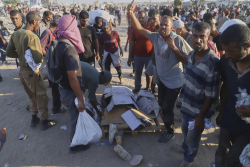In China, the world is witnessing the possible return of a far more technocratic elite that favors scaling back direct confrontation with the West.
The rumor mill is spinning in overdrive yet again. This time, the wind blows hard from the Far East, where unconfirmed reports indicate that Xi Jinping, the man who has ruled China with an iron fist since 2012—the most Mao-like leader since the Great Helmsman himself—has been quietly shown the door.
Renowned geopolitical analyst Gregory Copley has outlined to several media outlets what he has been hearing about the status of Xi Jinping. It does not bode well for China’s erstwhile president-for-life.
What’s Going on in China?
One of the points of interest for many China watchers who are starting to think that something is amiss with Xi Jinping’s rule is that many Chinese military leaders around him have been disappearing. These were not the usual removals because of “anti-corruption” investigations.
Throughout Xi’s tenure as the general secretary of the Chinese Communist Party (CCP), top military brass have been removed under the imprimatur of anti-corruption spearheaded by China’s strongman. In reality, these removals were done for political purposes—to allow for Xi to exert greater control by removing generals who were inimical to his rule.
But the military chiefs who have been removed in recent weeks were all loyalists to Xi. In fact, they were part of his inner circle. Their removal was not only a surprise to outsiders, but indicated that there was a fight occurring between the various factions of the Party.
Another point of interest has been the way in which Xi has been traveling without much of an entourage. Indeed, his personal bodyguard detachment has been cut in half. Given Xi’s high profile and the controversy which surrounds his rule, why would he willingly reduce his bodyguard contingent?
And a third point: Xi’s wife has not really been seen in public for some time, usually a sign that something is amiss behind the scenes.
The fact of the matter is that the factions of the CCP’s upper echelon have been duking it out for at least a decade. When Xi took power in 2012, he did his level best to purge as many opponents from the rank and file as possible. This pattern of behavior by Xi continued all the way through to last year’s People’s Congress, when Xi oversaw the dramatic public expulsion of his immediate predecessor, Hu Jintao.
This was important because former Chinese President Hu Jintao runs the “Youth League” Faction. Before his death, former Chinese President Jiang Zemin led the “Shanghai Gang”. While these various factions are all autocratic to some extent, they have differing views about how much power to wield—and how much to govern by consensus instead. Xi Jinping has always been the most autocratic of the various leaders vying for power.
Who Would Replace Xi?
Beyond that, Xi’s most likely direct successor is a technocrat named Wang Yang. He held various top positions in the CCP throughout his career before retiring. It is believed he will come out of retirement this fall to lead a transition out of the Xi Jinping era.
Another high-ranking CCP apparatchik, Hu Chunhua, is likely to play a role in the new era. Hu is an enemy of Xi’s who Xi blocked from becoming premier. Hu was aligned with former President Hu Jintao—and, indeed, Xi’s blocking of Hu Chunhua at last year’s party congress is believed to be what prompted Hu Jintao’s public removal from that gathering.
Another key player is a general named Zhang Youxia, the vice chairman of the Central Military Commission (Xi is the chairman) and China’s highest-ranking military officer. It is believed that as the man holding the gun, Zhang’s role is the most important one for ushering in this transition.
What the world is witnessing, then, is the possible return of a far more technocratic elite that favors scaling back direct confrontation with the West—and wants badly to restore its diminishing economic ties with Washington and the rest of the West. Under Xi, those ties have weakened and hostilities have increased.
These maneuvers have defined Xi’s time in power. Since the time of Deng Xiaoping, the man who replaced Mao Zedong, China has been ruled by a committee of elites that advised whoever was the president, and decisions were made by consensus. It was more akin to a corporate board of directors than it was a totalitarian cult of personality.
But after he took power in 2012, Xi started changing all that. By aggregating as much power as possible in his iron fist, he became the most powerful Chinese leader since Mao.
But in the process, Xi also made himself more vulnerable to his enemies. With great power comes great responsibility—and the more power Xi amassed, the more responsibility he held. When China’s economic growth was high and social unrest was minimal, Xi got all the credit. But when things started going badly, the blame was his alone. And over most of the past decade, China has faced one crisis after another—the 2019-2020 Hong Kong protests, the COVID-19 pandemic and protests over Beijing’s draconian restrictions, the collapse of the Chinese property market, and the ongoing trade war with the United States. As things got worse, Xi’s leadership style became more and more draconian in order to head off attacks from his rivals—antagonizing many of China’s old guard accustomed to a more moderate style of governance.
The Dynamics of a Xi Jinping Exit
Rumors abound that at some point in the fall, Xi Jinping will announce that he is stepping down as China’s paramount leader and will go into retirement with his family. This is likely the deal he cut with his successors: in exchange for going willingly, he and his family will be allowed to enjoy a peaceful retirement. To replace Xi, a more Deng Xiaoping-like cadre is set to take power.
Due to the fact that the new cadre will prefer commerce over conflict, the chances of a Chinese attack on Taiwan will decline significantly. What Beijing wants is a lifeline thrown to it from America. Under current conditions, such a lifeline from the Trump administration is unlikely. This is probably for the best; if the Trump administration does throw such a lifeline to a more reformist Chinese regime, then it will merely be restarting the brutal cycle of China feeding off American trade and intellectual property while building up their own challenge to the United States.
It is clear that the CCP is attempting to fundamentally change its leadership because there is a real risk to its survival. The Chinese elite believe Xi is the cause of that risk, and are moving swiftly to remove that threat. If reports are true, Xi will not be in power for much longer. We are witnessing Earth-shattering changes across the world at breakneck speed. Interesting times, indeed!
About the Author: Brandon J. Weichert
Brandon J. Weichert, a Senior National Security Editor at The National Interest as well as a contributor at Popular Mechanics, who consults regularly with various government institutions and private organizations on geopolitical issues. Weichert’s writings have appeared in multiple publications, including the Washington Times, National Review, The American Spectator, MSN, the Asia Times, and countless others. His books include Winning Space: How America Remains a Superpower, Biohacked: China’s Race to Control Life, and The Shadow War: Iran’s Quest for Supremacy. His newest book, A Disaster of Our Own Making: How the West Lost Ukraine is available for purchase wherever books are sold. He can be followed via Twitter @WeTheBrandon.
Image: Shutterstock.


















